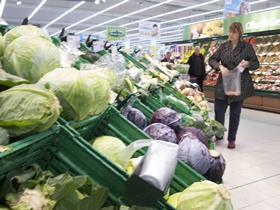
Britain’s heatwave helped slow shop price deflation with fruit and vegetable prices rising amid shortages in the past month.
According to the British Retail Consortium’s Nielsen Shop Price Index, prices in July fell by 0.3 per cent, lower than June’s 0.5 per cent deflation figures.
It still meant that shop price deflation continued its march, notching up the 63rd month of deflation. The slowdown was largely thanks to fresh produce price rises, which increased overall by 1.2 per cent, from 0.8 per cent in June.
Ambient food inflation leaped 2.2 per cent in July, compared to 1.6 per cent last month.
Helen Dickinson OBE, chief executive of BRC said: 'Food inflation increased in July, with vegetables and fruit affected in particular thanks to the effects of a cold spring and the recent prolonged dry period. This month also saw non-food items reach their lowest level of deflation since December 2017.
'We expect this period of food price inflation to continue in coming months as despite global oil, food and commodities prices shrinking recently, the hot, dry conditions we have seen across the northern hemisphere means the pressure on prices will continue for some time to come.”
Mike Watkins, Head of Retailer and Business Insight, Nielsen said trading conditions remained“challenging”however. 'The slight increase in food inflation over the early summer has been offset by increased demand for food and drink as the result of the heatwave and incremental spend around the World Cup.






No comments yet